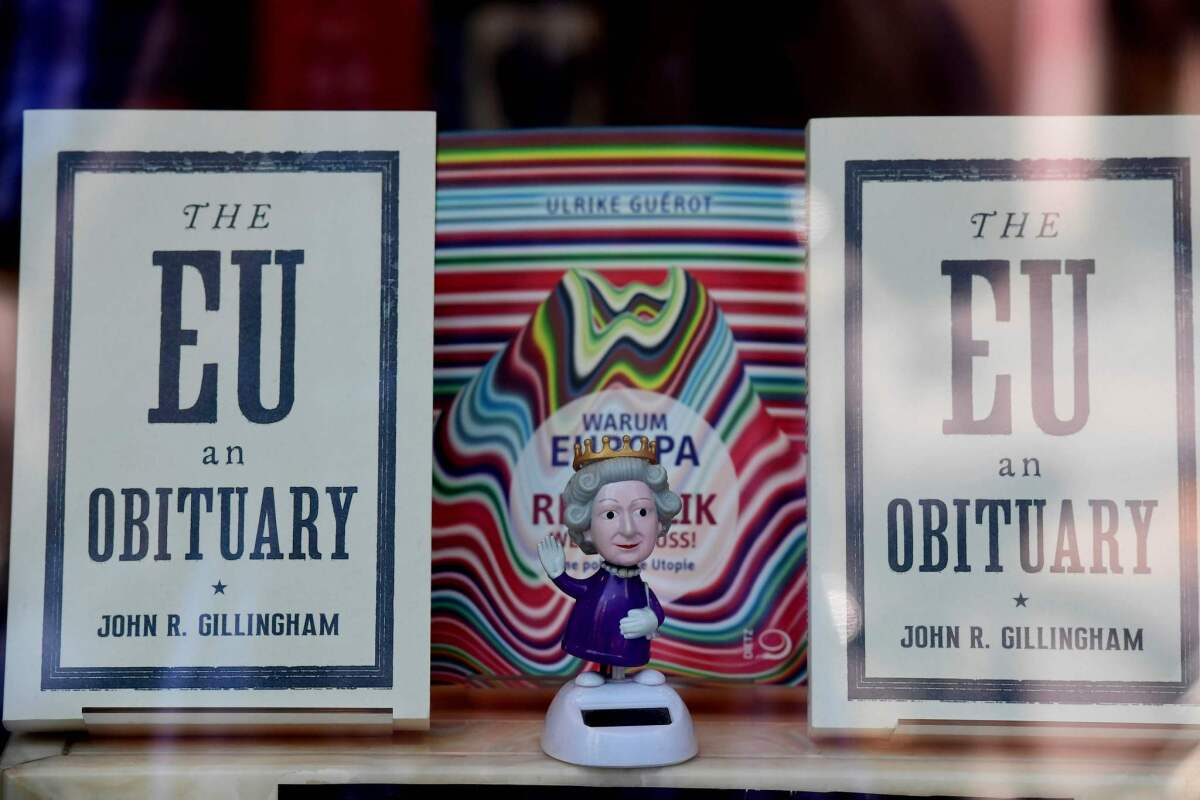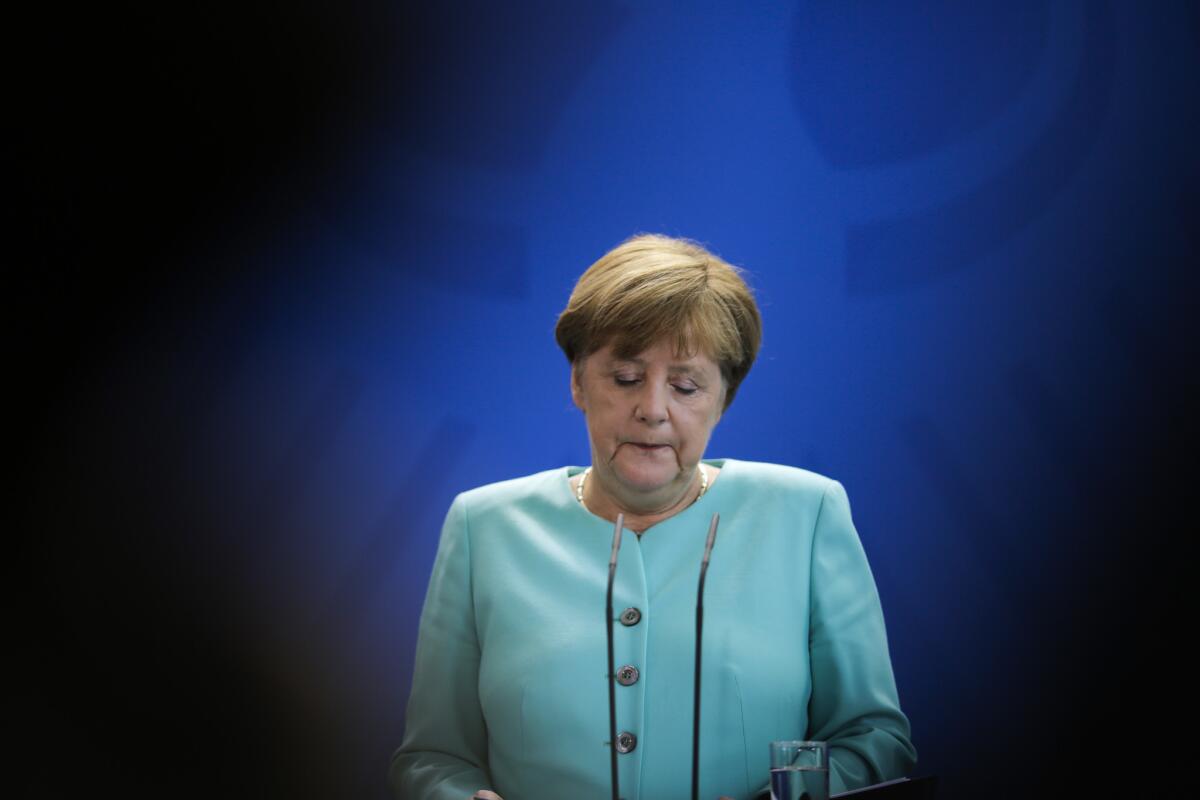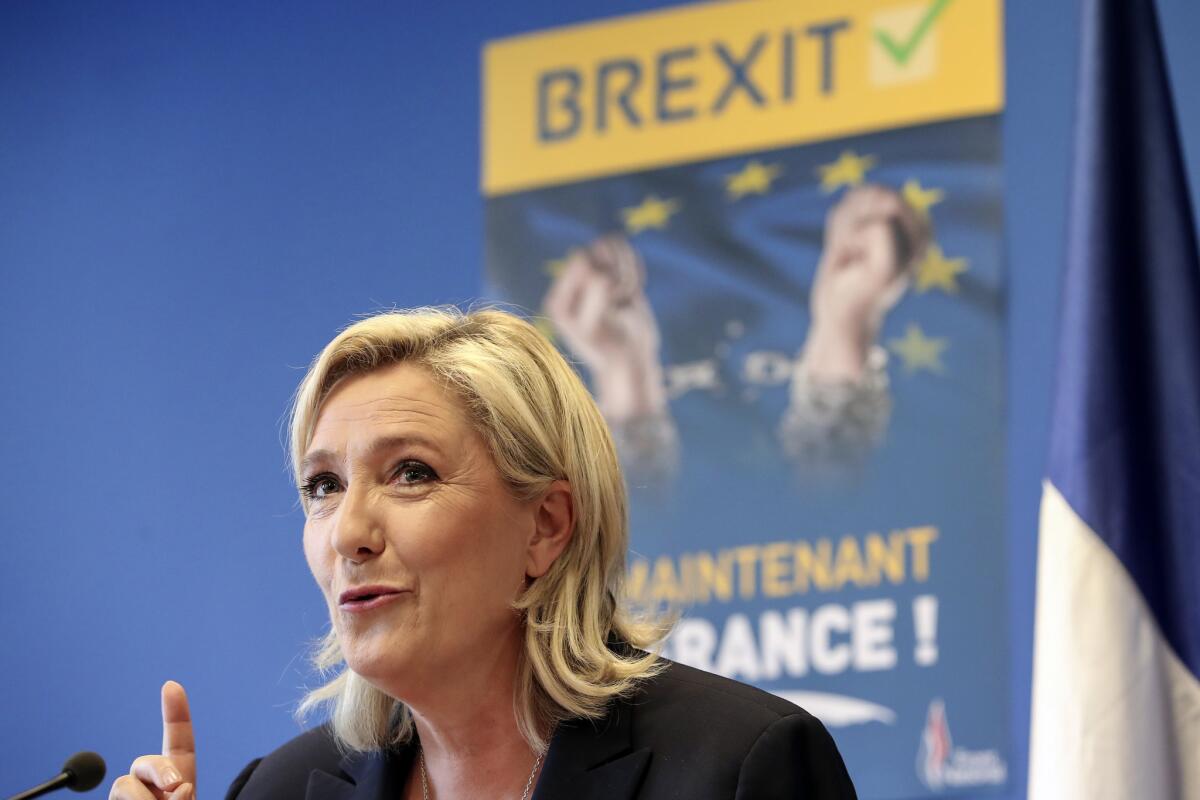The EU’s stalwarts are forlorn as Britain sails away

- Share via
Reporting from Berlin — Britain’s decision to leave the European Union might not mark the beginning of the end for continental unity, but that possibility was in the air Friday as Europe’s leaders struggled to put the best face on their new reality after the “Brexit” vote.
“There’s no way to put a positive spin on this -- today is a setback for Europe,” said a glum-looking German Chancellor Angela Merkel, urging the continent to remain “prudent” and analyze the situation calmly. “The EU is strong enough to find the right answers.”
The surprise vote to leave the EU encouraged anti-establishment parties in France, Denmark and the Netherlands to push for their own “leave” referendums, and also unleashed powerful separatist forces within Britain itself. Political leaders in Scotland and Northern Ireland, where voters opposed the Brexit, said they want to leave the United Kingdom so that they can remain in the EU.
In Brussels and Berlin, Paris and Prague, presidents, chancellors and prime ministers could barely contain their disbelief. There was a whiff of panic in the air in European capital cities after Britain became the first nation to vote to abandon the EU, a free trade zone and ever-closer political union that has been a bulwark for peace and prosperity for some six decades.
Given the size of the British economy, it’s as if California decided to leave the United States.
Even though British opinion polls had indicated it would be a close decision that could go either way, EU leaders seemed to be caught flat-footed by the 52-48% decision to leave and it quickly became clear Friday that they had no Plan B.

“There is no way of predicting the consequences of this event, especially for the U.K.,” Donald Tusk, a former Polish prime minister and the president of the European Council that leads the 28-member EU, said in Brussels -- sounding uncharacteristically at a loss for ideas. “It’s a historic moment but not a moment for hysterical reactions. We are determined to keep our unity as 27.”
That may be easier said than done. Opposition leaders in the Netherlands and France immediately said they felt emboldened to pursue their campaigns to exit the EU using arguments that won the day in Britain: that their national identities are being subsumed amid EU rules and rising numbers of immigrants, and that their concerns are being neglected by elected leaders.
Proposals for a joint path forward are unlikely to emerge any time soon, because the two largest countries left, Germany and France, have such strikingly different visions of how the EU should proceed without Britain.
While France is eager to deepen the political and economic union, in part to spur growth now that pro-business Britain is jumping ship, Germany’s austerity-minded leader, Merkel, remains leery about costly pump priming and anything that carries a whiff of socialism.
Also, some EU countries such as France want to punish Britain with harsh and speedy divorce terms in order to frighten off other leave candidates. Germany is expected to try to find more pragmatic solutions that will maintain ties with Britain and keep high levels of trade flowing, analysts said.
“[British Prime Minister David] Cameron was politically an idiot to call this referendum,” said Thomas Jaeger, a political scientist at Cologne University. “But at the same time, it would be a mistake for the EU to pursue a vindictive policy of ‘good riddance’ and ‘let’s stick it to them now.’ That could really backfire on the EU, and Germany will try to prevent that.”
Merkel, who desperately wanted to avoid Brexit and tried to help Cameron get what he needed at EU summits, has said little in public so far. She appeared to be clearly shaken while making a midday statement in Berlin on Friday and quickly left without taking questions.
Her foreign minister, Frank-Walter Steinmeier, will host a meeting of foreign ministers in Berlin on Saturday. Merkel will meet with French President Francois Hollande and Italy’s Prime Minister Matteo Renzi in Berlin on Monday to discuss the next steps.
Brexit appeared to defy economic reason to many in Germany and elsewhere in Europe, and cast doubt over the future of the bloc.
This is an historic breaking point and the shock waves are simply too enormous to fully gauge at this point.
— Paul Nolte, a political scientist at Berlin’s Free University
Opinion polls in some EU countries, including the Netherlands and Denmark, show majorities in favor of leaving. The British vote also galvanized far-right and anti-EU movements in France and Germany, the EU’s last two remaining powers, which will have tricky national elections in 2017 due to the rise in anti-establishment sentiment.
“This is an historic breaking point and the shock waves are simply too enormous to fully gauge at this point,” said Paul Nolte, a political scientist at Berlin’s Free University. “It’s difficult to say today what the consequences for the EU are because of the centrifugal forces coming out of this vote. It will certainly give the populist forces across Europe an enormous lift.”
In the Netherlands, anti-immigration leader Geert Wilders, who is seeking to become the country’s next prime minister, called for a referendum on his country’s EU membership “as quickly as possible.”
“We want to be in charge of our own country, our own money, our own borders and our own immigration policy,” Wilders said.
In France, one of Hollande’s rivals in next year’s presidential election, the far-right National Front leader Marine Le Pen, proclaimed the British vote a “victory for freedom.”

Germans, and others in the EU, are also worried that the departure of Britain could force Germany into even more of a leadership role -- which could lead to fears in France and elsewhere of being dominated from Berlin on a continent where the ghosts of World War II are never far away.
Finally, there was further trouble for Britain on its southern flank Friday when Spanish Foreign Minister Jose Manuel Garcia Margallo reignited a 300-year-old fight by saying that Gibraltar, a 2.5-square-mile piece of British territory on the southern tip of Spain, should be returned to Spain.
“The Spanish flag is now much closer to flying over Gibraltar,” he told Spanish radio.
Kirschbaum is a special correspondent.
More to Read
Sign up for Essential California
The most important California stories and recommendations in your inbox every morning.
You may occasionally receive promotional content from the Los Angeles Times.










